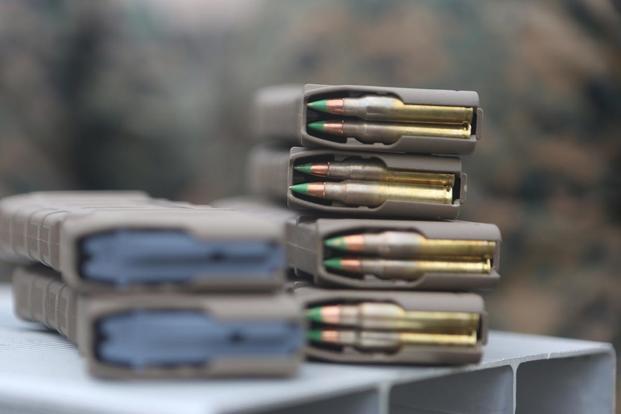NATIONAL HARBOR, Md. -- A senior Marine Corps official confirmed today that the service is lockstep with the Army's effort to search for a rifle round more potent than the current 5.56mm round.
For months, senior Army officials have been telling Congress that the current 5.56mm Enhanced Performance Round is not potent enough to penetrate enemy body armor plates similar to U.S. military-issue rifle plates such as the Enhanced Small Arms Protective Insert, or ESAPI.
As a solution, the Army is experimenting with a plan to replace its M249 squad automatic weapon and M4 carbine with futuristic weapons that fire a 6.5mm case-telescoped round or something that falls between a 5.56mm and a 7.62mm round.
The Marine Corps, which recently decided to buy more M27 5.56mm Infantry Automatic Rifles, has not publically echoed the Army's concern with 5.56mm until now.
"We are working the Army; we have looked at the 6.5mm Creedmoor with the Army and [Special Operations Command]," Brig. Gen. Joseph Shrader, commander of Marine Corps Systems Command, told Military.com at the annual Sea-Air-Space exposition Wednesday.
"We are lockstep with them looking at a new round."
Shrader, however, said he did not know if the effort would mean a new infantry weapon for the Marine Corps.
Lt. Gen. John Murray, deputy chief of staff for Army G8, told Congress in February that the Army already has a science and technology demonstration weapon, made by Textron Systems.
The working 6.5mm prototype has evolved out of Textron's light and medium machine guns that fire 5.56mm and 7.62mm case-telescoped ammunition developed under the Lightweight Small Arms Technology program.
Over the last decade, the Army has invested millions in the development of the program, which has now been rebranded to Textron's Case-Telescoped Weapons and Ammunition.
While the Textron weapon is "too heavy," Murray said the Army has opened the effort up to industry to come in and develop new prototypes for testing.
The Army had planned on fielding a the new Next Generation Squad Weapon by 2025 or 2026, but the service has now accelerated the effort to have some kind of initial capability by 2022 or 2023 at the latest, Army officials say.
-- Matthew Cox can be reached at matthew.cox@military.com.










